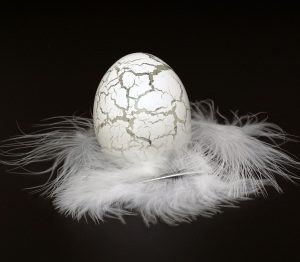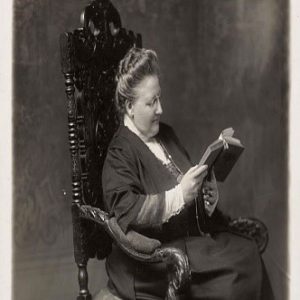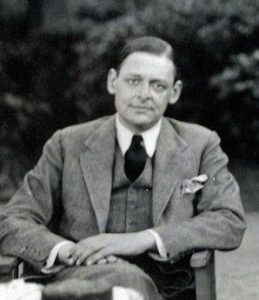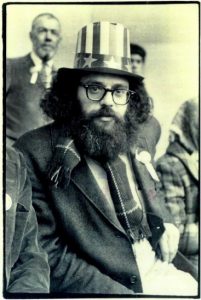15

Probably the easiest truism to make about the poetry of the early twentieth century, a time known by the name Modernism, is that it was boldly experimental. It was more experimental with regard to form and subject than poetry had been in any period in its English-language history. (The only time to rival it occurred in the late middle ages, when syllabic, alliterative verse gave way to meter and rhyme.) In the Modernist period, long-standing conventions of meter and rhyme were swept away, with nothing as definite as syllable or meter to determine the length of a line, and no definite pattern of sound. One of the most prominent and influential poets of the era, the American Ezra Pound, stated at one point that it was his task to “break the back of the iamb”—which, as you learned several weeks to, had been the most prominent feature of poetry since the time of Chaucer.
 Pound and the Modernists had great success in freeing poetry from the straitjacket of meter. Although traditional forms and meters did not disappear, they no longer dominated poetry. It was a time when it seemed that almost anything was possible. Poems varied from the astonishingly simple verse written by William Carlos Williams, H.D., and Amy Lowell, to the highly allusive, imbricated verse of Pound and T.S. Eliot. Consider the following two examples, the first by Amy Lowell:
Pound and the Modernists had great success in freeing poetry from the straitjacket of meter. Although traditional forms and meters did not disappear, they no longer dominated poetry. It was a time when it seemed that almost anything was possible. Poems varied from the astonishingly simple verse written by William Carlos Williams, H.D., and Amy Lowell, to the highly allusive, imbricated verse of Pound and T.S. Eliot. Consider the following two examples, the first by Amy Lowell:
Autumn
All day I have watched the purple vine leaves
Fall into the water.
And now in the moonlight they still fall,
But each leaf is fringed with silver.
You’ve read several poems like this one. It may remind you of “The Red Wheelbarrow.”
This next one is by T.S. Eliot .
A Cooking Egg
En l’an trentiesme de mon aage
Que toutes mes hontes j’ay beues …
Pipit sate upright in her chair
Some distance from where I was sitting;
Views of the Oxford Colleges
Lay on the table, with the knitting.
Daguerreotypes and silhouettes,
Her grandfather and great great aunts,
Supported on the mantelpiece
An Invitation to the Dance.
. . . . .
I shall not want Honour in Heaven
For I shall meet Sir Philip Sidney
And have talk with Coriolanus
And other heroes of that kidney.
I shall not want Capital in Heaven
For I shall meet Sir Alfred Mond:
We two shall lie together, lapt
In a five per cent Exchequer Bond.
I shall not want Society in Heaven,
Lucretia Borgia shall be my Bride;
Her anecdotes will be more amusing
Than Pipit’s experience could provide.
I shall not want Pipit in Heaven:
Madame Blavatsky will instruct me
In the Seven Sacred Trances;
Piccarda de Donati will conduct me.
. . . . .
But where is the penny world I bought
To eat with Pipit behind the screen?
The red-eyed scavengers are creeping
From Kentish Town and Golder’s Green;
Where are the eagles and the trumpets?
Buried beneath some snow-deep Alps.
Over buttered scones and crumpets
Weeping, weeping multitudes
Droop in a hundred A.B.C.’s
We haven’t read much poetry like this. Could you follow it ? Did you give up before you got to the end ? We wouldn’t blame you.
“Autumn” is about as simple as a poem can get. On the other hand, “A Cooking Egg” leaves you adrift. “Autumn” provides a single image, but says nothing about that image. It leaves you to see in that image what you find appropriate (knowing that you will associate “autumn” with the approaching end of things). “A Cooking Egg,” tells you to work hard and to recognize and translate medieval French (without the help of the internet), and to figure out how the old French poem applies to his. Eliot’s poem leaves readers thinking they’ve missed something. It may be that a lot of poems have left you feeling that way, but for the first time that idea seems to be built into the poem itself.
Having read much of this Modernist poetry, the critic C. S. Lewis, had this to say:
To say that all new poetry was once as difficult as ours is false; to say that any was is an equivocation. Some earlier poetry was difficult, but not in the same way. Alexandrian poetry was difficult because it presupposed a learned reader; as you became learned you found the answers to the puzzles. Skaldic poetry was unintelligible if you did not know the kenningar, but intelligible if you did. And—this is the real point—all Alexandrian men of letters and all skalds would have agreed about the answers. I believe the same to be true of the dark conceits in Donne; there was one correct interpretation of each and Donne could have told it to you. Of course you might misunderstand what Wordsworth was “up to” in Lyrical Ballads; but everyone understood what he said. I do not see in any of these the slightest parallel to the state of affairs disclosed by a recent symposium on Mr. Eliot’s [A] Cooking Egg. Here we find seven adults (two of them Cambridge men) whose lives have been specially devoted to the study of poetry discussing a very short poem which has been before the world for thirty-odd years; and there is not the slightest agreement among them as to what, in any sense of the word, it means. (“De Descriptione Temporum”)
Lewis laments that poems no longer convey a single, agreed-upon meaning to all readers. If twentieth- and twenty-first-century students in the English speaking world are quick to take the stand that a poem means whatever the reader thinks it means (a statement that would not have occurred to a living soul between Adam and about 1920), we probably have the Modernists to thank for it. Although there’s no evidence I know of to suggest that Modernists anticipated that state of affairs in which readers confronted with the difficulty of the text simply gave up and declared “It means whatever I want it to mean,”[*] they perhaps unwittingly invited their readers to do so. The fact is that much of this poetry assumes a reader as adept in poetry and, in fact, in all of literature as the authors were themselves—and sometimes adept in other things as well (Ezra Pound now and then included Chinese characters in his poems even though he did not read or speak Chinese). Modernists often expected their readers to do the necessary research, to struggle through and find out what their writing was all about. (James Joyce, a writer of fiction, once suggested that to understand his work, a reader would have to devote his entire life to studying it.) These works do not imply the knowledge base or reading sophistication of the average 18-year old. And much of this poetry is too open or too associative in its logic to be easily restricted to any single, monolithic understanding.
Much of the literature of the time manifests a desire not to give up on reading but to change the way that we read. If you try to read Eliot’s poetry in the same way that you read Beowulf, Paradise Lost or Lyrical Ballads you will be frustrated. The hierarchy of value has been broken. In that hierarchy allusions support—are subject to—a singular, central meaning. In Modernist poetry, the element of meaning, while still absolutely present, is no longer king; it is limited, but no longer necessarily singular.
In fact, Modernist poetry takes advantage of an aspect of language which poetry would seem to have a natural affinity for: even the simplest, easiest-to-understand utterance is potentially infinite in its meaning—or in its ability to create and become involved with meaning. There’s nothing radical about that claim. For a word to be transferable from any one context to any other context it must be infinitely transferable. Most often actual uses of language—me talking to you, me writing this lecture to you, you talking on the phone to your mother, Shakespeare performing the ghost of Hamlet’s father—work very hard to limit the ways that the words can be taken. But this does not affect the fact that language is in itself illimitable. It is like liquid which must be precisely held in a solid container or it goes everywhere. The container will give it measurable shape. In itself it has no shape but will conform for the moment to whatever shape it finds itself in. Modernist poetry still gives language shape, but it tends to give it a looser shape, shapes that let more of its inherently shapelessness appear.
That’s not to say that all twentieth-century poetry or even all Modernist poetry is this way. In addition to Williams and Eliot and Pound, there is Robert Frost, and Elizabeth Bishop, and Edna St. Vincent Millay, and William Butler Yeats—and of course many many others—who work in traditional forms. Eliot himself often rhymes, often writes in iambic pentameter. So does Williams and sometimes even Pound. There’s a lot of experiment going on in Modernist poetry; it involves every aspect of language. Early twentieth-century poetry is characterized more by this experimentation than by its frequent lack of meter or rhyme.
The period of Modernism, with its convolutions and confusions, gave way, inevitably, to a period of reaction. Beginning in the mid-century, a great number of poets came to believe that the work of T. S. Eliot and company was taking poetry away from it ancient base—which it was—denying it the ability to reach ordinary people, those who could not or did not wish to devote weeks, months, or lifetimes to reading a few esoteric lines. Among the best known groups of such poets were the Americans known as the “Beats,” the most prominent example of whom is Allen Ginsberg. Beat poets still wrote in open form, but created a poetry much simpler, much more steeped in immediate experience and emotional intensity that the cerebral poems of the Modernists ever aspired to be. Here,  for example, are the first lines of Ginsberg’s famous poem, “Howl,” a poem that hops over the advances of Modernism and returns us to (and updates) the poetics of Walt Whitman:
for example, are the first lines of Ginsberg’s famous poem, “Howl,” a poem that hops over the advances of Modernism and returns us to (and updates) the poetics of Walt Whitman:
Howl
For Carl Solomon
I
I saw the best minds of my generation destroyed by madness, starving hysterical naked,
dragging themselves through the negro streets at dawn looking for an angry fix,
angelheaded hipsters burning for the ancient heavenly connection to the starry dynamo in the machinery of night,
who poverty and tatters and hollow-eyed and high sat up smoking in the supernatural darkness of cold-water flats floating across the tops of cities contemplating jazz,
who bared their brains to Heaven under the El and saw Mohammedan angels staggering on tenement roofs illuminated,
who passed through universities with radiant cool eyes hallucinating Arkansas and Blake-light tragedy among the scholars of war,
who were expelled from the academies for crazy & publishing obscene odes on the windows of the skull,
who cowered in unshaven rooms in underwear, burning their money in wastebaskets and listening to the Terror through the wall,
who got busted in their pubic beards returning through Laredo with a belt of marijuana for New York,
who ate fire in paint hotels or drank turpentine in Paradise Alley, death, or purgatoried their torsos night after night
with dreams, with drugs, with waking nightmares, alcohol and cock and endless balls,
incomparable blind streets of shuddering cloud and lightning in the mind leaping toward poles of Canada & Paterson, illuminating all the motionless world of Time between,
Peyote solidities of halls, backyard green tree cemetery dawns, wine drunkenness over the rooftops, storefront boroughs of teahead joyride neon blinking traffic light, sun and moon and tree vibrations in the roaring winter dusks of Brooklyn, ashcan rantings and kind king light of mind…
While not every poet of the mid- to late-twentieth century took Whitman as the model, the poetry of this Postmodern era generally became simpler, easier to read, while it retained the poetic movement away from traditional forms dominated by rhyme and meter. Indeed, during the sixties and seventies it would have been difficult to find a newly published poem that rhymed. At present poetry is doing nothing more profoundly than trying to figure out why it exists in a world in which more and more poetry is published by smaller and smaller presses for fewer and fewer readers, most of them academics, poets, or students. Poetry still has occasional high-profile moments, such as when Maya Angelou read a poem at Bill Clinton’s second inaugural, or when a celebration of poetry was abruptly cancelled at the White House for fear the invited poets would use the platform to protest America’s invasion of Iraq. But at present poetry in the English-speaking world, leads a mostly underground life. It is still everywhere, most people, most of the time, manage to ignore it.
[*] There were those, like Wallace Stevens, who said that poetry did not need to have a meaning. But that’s not the same as saying that poetry means whatever you want it to.
Video Lecture: The 20th Century
Some Poems:
Thomas Hardy, “The Darkling Thrush” (Links to an external site.)
A. E. Housman, “To an Athlete Dying Young” (Links to an external site.)
William Butler Yeats, “Easter 1916” (Links to an external site.)
Robert Frost, “Birches” (Links to an external site.)
“Stopping by Woods on a Snowy Evening” (Links to an external site.)
Carl Sandburg, “Chicago” (Links to an external site.)
Wallace Stevens, “Anecdote of the Jar” (Links to an external site.)
“Thirteen Ways of Looking at a Blackbird” (Links to an external site.)
D. H. Lawrence, “Piano” (Links to an external site.)
Ezra Pound, The Cantos, “I” (Links to an external site.)
H. D. “Garden” (Links to an external site.)
T. S. Eliot, “The Lovesong of J. Alfred Prufrock” (Links to an external site.)
John Crow Ransom, “Bells for John Whiteside’s Daughter” (Links to an external site.)
Edna St. Vincent Millay, “First Fig” (Links to an external site.)
Wilfred Owen, “Dulce Et Decorum Est” (Links to an external site.)
Langston Hughes, “The Weary Blues (Links to an external site.)”
Lawrence Ferlinghetti, “Dog” (Links to an external site.)
Denise Levertov, “Pleasures” (Links to an external site.)
Allen Ginsberg, “Howl, Part I” (Links to an external site.)
Adrienne Rich, “Aunt Jennifer’s Tigers” (Links to an external site.)
Sylvia Plath, “Lady Lazarus” (Links to an external site.)
Rita Dove, “Dusting”
